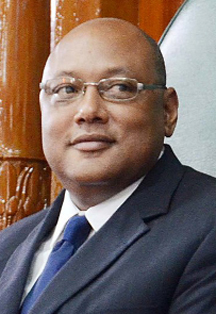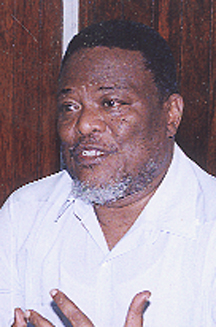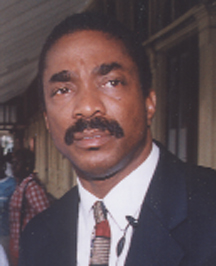Speaker of the National Assembly Raphael Trotman yesterday ruled to defer three motions tabled by members of the opposition to amend the Standing Orders to reconfigure key committees.
The government objected to proceedings, citing the omission of a draft of the amendments to the Standing Orders that the three motions contemplated. Prime Minister Sam Hinds also asked that the motions not be proceeded with because of the action that the government is pursuing in the High Court to settle the composition of parliamentary committees.
“I rule that the motions, as they are, are not out of order. But it is the notices, issued by the Parliament Office, which went out without the requisite amendments. Those are out of order. This afternoon we are unable to proceed to entertain them because the notices are bad and the Clerk’s Office will have to take some responsibility for that,” Trotman said.
“However, I will exercise my discretion by abridging the time and will not revert us back to the 12 days. I rule that the time for notices to go out will be 48 hours with amendments and that the matters be placed on the Order Paper for the next sitting of Parliament,” he added.

“The Motions will not go forward today but they would not be struck out… the Parliament Office will issue new notices and [for] those notices the time will be abridged to 48 hours,” he said.
“I have conferred with the Clerk and the Clerk advises me that there must be a copy of the proposed amendment or amendments accompanying the Motion and that he has erred, whether by oversight or inadvertence or being busy or otherwise, he said that it was his error that he allowed the Motions to come on to the Order Paper without the requisite amendments being attached,” he said.
The motions, which deal with the right to vote in parliamentary committees, the composition of the Parliamen-tary Management Committee, and representation on sectoral committees, will now be considered on Budget Day, next Friday.
‘Squabbling’
Trotman, however, added his disappointment at the fact that the business of the House has been reduced to “squabbling” for every minute detail. “But I suppose that this will characterise the Tenth Parlia-ment. Hopefully we will settle down and get beyond it. I am troubled by the fact that the matter which was brought to my attention literally minutes before I came to sit could have been brought to my attention before and [this lends to the impression that] it was brought at this time to frustrate the business,” he said, adding that as the Chairman of the Standing Orders Committee, “whatever happens I would be hearing and chairing these proceedings.”

Earlier, Hinds drew the attention of the House to Standing Order 111 that deals with the amendment of the Standing Orders and the need for there to be not less than 12 days’ notice and that the notice shall be accompanied by a draft of the proposed amendments. He added that the motions, which all call for amendments to Standing Orders, were not accompanied by proposed amendments. “We therefore submit that the requirements of Standing Order 111 have not been met and we do not think that these Motions, here and now, are properly before this House,” he said.
In response, APNU MP Basil Williams, the mover of one of the Motions that would have been considered yesterday, said that the Speaker had discretion to allow the Motions to be debated, despite the concerns of the government. “With reference to Standing Order 111 as contended by the Prime Minister, [he] omitted these words, ‘unless the Speaker shall otherwise direct.’ Those words convey that the Speaker has discretion in this matter,” Williams said.
“The discretion that you have [is important]. These rules are meant not to hinder our internal business but merely to facilitate our business,” he added.
While calling the matter a storm in a teacup, Williams implored the Speaker to allow the motions to be debated, with the submission of the necessary amendments made at a later time.
Speaking on behalf of the AFC, MP Khemraj Ramjattan said that the rules “must not be our masters,” while arguing that they must serve the House to get the business of the Parliament moving forward.

Ramjattan made the point that the amendments to the Standing Orders as proposed by the motions were inherent in the motions. “Even though there might have been an overlooking by the mover of the Motion, the seconder of the Motion and to a certain extent the Clerk, not realising probably that there was this requirement, we are not going to try to self-flagellate at this point to the extent that we are going to waste the time of this Parliament, all the cost involved here in a private Wednesday for the purposes of now delaying it, so that we could come back another day just to get the Notice there,” he said.
Presidential Adviser on Governance and PPP/C MP Gail Teixeira said the House must be careful not to fall prey to capriciousness. “The rules of the House have been developed over time and as of July last year, we went through another revision at a Parliamentary Select Com-mittee made up of members of all the parties,” she said.
“The point is whether it is an oversight or not, the reason why a draft amendment is included in Standing Order 111 (1) is to allow the House to know what is the exact wording of the amendment to the Standing Order. Mr. Speaker, I am appealing to you that this level of capriciousness is a dangerous road this Parliament is going down,” she said. “In looking at the three motions, one can have no idea of what the exact wording of each of the amendments will be,” she added, while saying that in the exercise of the Speaker’s discretion, there should be no harm. Further, she said that the Speaker could direct that the draft of the amendment be submitted in 48 hours of the end of the sitting. “It is trivial,” she said.
APNU Vice-Chairman and MP Dr. Rupert Roopnaraine, meanwhile, assured Teixeira and the other members of the government that the opposition has no interest in either capriciousness or anarchy.
“If you were to read the motions, there would be no doubt as to what the actual draft will be,” he said. “I also accept that it was an error of omission, that a draft ought to have been submitted,” Roopnaraine said. “I am urging that we move on with the business of the Assembly,” he added.




